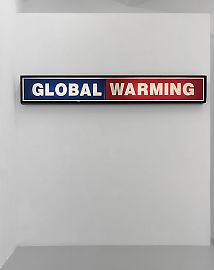Peter Fend -- GLOBAL WARMING
press release:
GLOBAL WARMING: A RAPID RESPONSE REMARK
by Peter Fend
During the Summer of 1999, the many warnings given to us by scientists about Global Warming were confirmed. In New York, we suffered the hottest summer ever, and we experienced new diseases, including the first ever cases of malaria. Near Argentina, there melts a piece of the polar icecap larger than anything in recorded history, a territory of ice the size of Rhode Island. In the Himalayas, in Mexico, in the Alps, rain or snow fall as never before in history, causing mudslides and avalanches. In the Caribbean, the fish are dying off at record rates. Throughout the North Atlantic, the salmon are disappearing. Throughout the tropics, the coral reefs are dying as never before-due, at least in part, to rising ocean temperatures.
Every day, 75 million barrels of oil, drawn up from eons ago, are burned on the planet. This number increases. Next year it is expected to increase at twice the previous rate. Ten years ago, the UN Intergovernmental Panel on Climate Change declared that fossil fuel emissions must be cut back 60% "now, or else". That did not happen. We are now living with "or else".
During this past summer, exasperated by the climate distortion, four artists in New York got together, saying that what's going on is not just bad, it's UNACCEPTABLE. These four individuals - Christina Cobb, Peter Fend, Julia Fischer, William Meyer - met repeatedly, set up files, coined the name RAPID RESPONSE for their joint effort, traveled to DC and talked with experts, then concentrated on ways to show how mineral fuels can be replaced.
The first visible result of these actions is a remark by Peter Fend made upon visiting the outdoor space at the back of Nikolai Fine Art, a space just behind the high-tech Exxon gas station at 23rd Street and 10th Avenue: a sign, 22 feet long, about as wide as the gallery's building, saying "GLOBAL WARMING."
Global Warming is the chief product of the business activities of firms like Exxon. Just inside the gallery, RAPID RESPONSE will be presenting documents of the many alternatives now available, most of them low cost, to fossil or nuclear fuels. These include: wind, solar, hydro, geothermal, wave, thermal gradient and biomass, among others. In a recent issue of Science, published by the American Association for the Advancement of Science, Dr. John Turner of the Department of Energy's National Renewable Energy Laboratory, says that technical means exist today - in abundance - for meeting all of our energy needs without any fossil or nuclear fuels. His views align with those of scientists with whom we correspond at the nation's top technical schools, like Caltech. And with nuclear accidents on the rise, with temperatures worldwide out of whack, the facts are clear: there's no time to wait.
The GLOBAL WARMING sign marks a launch. It enters the aesthetic field of those American industrial-landscape paintings - by Ed Ruscha, Alan D' Arcangelo or Edward Hopper - which elevated the gas station to icon status. And it creates a presence, a moral and collective voice, which intervenes in this landscape with a stark truth: those gas stations, as now used, distribute the products that cause Global Warming.
Other gas stations in the NY area will be subject to signage like this, with GLOBAL WARMING or similar terms hovering overhead in matching corporate colors. Visitors to the gallery are invited to invest in such alterations of the urban landscape, directed towards cleaning up the air and water, with a net gain for the economy.
This project, an urbanistic action, is conducted in cooperation with American Fine Arts, Co. Inc., 22 Wooster Street (212 941-0401), and RAPID RESPONSE, a four-person convergence of different practices, namely: Christina Cobb, Peter Fend, Julia Fischer, William Meyer, each with their own professional structures and skills brought to bear.


